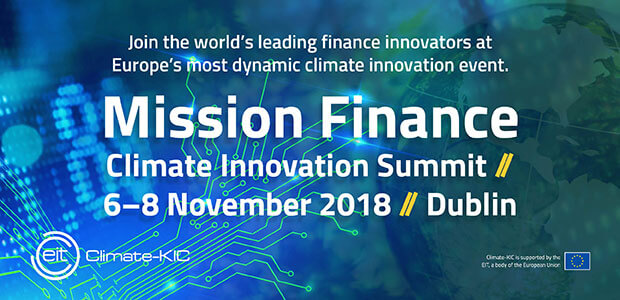Financing tomorrow’s new normal today
In The News
30 Oct 2018
First published in Environmental Finance as part of a joint series covering the Climate Innovation Summit.
Across most industries, quick wins for decarbonisation – at least within current frameworks – have already been put in place. Innovative finance will be needed to unlock investment across all sectors and industries. Environmental Finance explores how investors can enter uncharted waters to truly drive change.
Economic growth will be lower if global warming reaches 2C above pre-industrial levels than at 1.5C, according to the recently published Intergovernmental Panel on Climate Change (IPCC) special report. Shifting focus to a 1.5C target means the move to a decarbonised economy needs to happen a lot faster across all sectors and industries.
“The scenario most often cited in the IPCC Report is net-zero globally by 2050,” says Kirsten Dunlop, CEO of EIT Climate-KIC. “The safest pathways would see us reaching net zero much earlier, certainly in richer nations.”
Innovative financial solutions and partnerships will be key to making this happen. Many of the “quick wins” have arguably already taken place, with most industries having undertaken the decarbonisation efforts easily available to them within current market structures. The energy sector is rapidly transitioning to low-carbon alternatives, but other crucial parts of a decarbonised economy have proven more difficult to finance, such as energy efficiency retrofits, agriculture, sustainable land-use and cities, says Dunlop.
The IPCC report should trigger a greater focus on disruptive solutions and on what is “hard to achieve”, she adds. She explains the investment implications of achieving a net-zero emissions economy are primarily understood as the need to scale-up existing solutions and that sustainable finance often focuses on “the low-hanging fruit”.
These assumptions need to be challenged for more innovative investments to take place and for climate change to be mainstreamed into the financial system, she says, adding: “There’s a need for rethinking what types of capital are deployed.”
This is echoed by Dennis Pamlin, who is working with EIT Climate-KIC and other partners on the Mission Innovation 1.5C-compatible investor framework. He says climate change needs to be solved at such a quick pace that investors can’t stay away from new solutions that aren’t yet commercialised. “I’m not talking about pie-in-the-sky solutions here but about ideas that exist but need help to grow exponentially.”

And there are plenty of initiatives underway to accelerate investment into areas often branded “notoriously difficult” to finance by investors and lenders. For example, the rewards of financing energy efficiency retrofits could be huge but deployment is slow. Buildings are responsible for 36 per cent of CO2 emissions in the EU but the annual energy saving renovation rate is only between 0.4-1.2 per cent in member states, according to the European Commission. To address this, EIT Climate-KIC is working with South Pole and other partners to create a bankable pipeline of European public building retrofits and find innovative business models and funding solutions to sustain these platforms.
In agriculture, climate resilience bonds are emerging as a way for financial investors to put their capital into climate-related activities. At present, green and resilience bonds are primarily being raised for energy infrastructure, but Srini Sundaram, CEO of EIT Climate KIC-backed Agvesto, says criteria are being worked out for land-use climate bonds.
Agvesto, a technology company looking to enable better access to capital and climate risk protection into the agricultural sector, is working with the Climate Bonds Initiative to establish “what areas we should be thinking about in agriculture and sustainable land-use and how to assess such bonds”. The company aims to launch a rating and assessment platform next year for resilience bonds and Sundaram hopes this added transparency in the market will help trigger more investment in sustainable agriculture and insurable farmland. “The alternative is the problem gets worse and ends up on our doorstep – it’s our responsibility to come together, both the public and private sector, to solve it,” he says.
Land-use accounts for one-fourth of world emissions but only around one per cent of green finance is directed towards land-based solutions as they are often perceived as difficult to structure and de-risk. Paul Chatterton, founder of the WWF Landscape Finance Lab, backed by EIT Climate-KIC, is working to unlock more integrated landscape financing and make them more accessible to the private sector.
“Landscape programmes take quite a while to get off the ground, sometimes it will take more than five years to get them up and running with full financing,” Chatterton says. “We need to be much faster, much simpler and we need to bring the private sector in. That’s what the lab is experimenting with and we have 25 landscapes on the platform of which six are now going through the development and structuring phase.” The aim is, he adds, to move some of these programmes into the financing phase next year. Eventually, the idea is to systematise the landscape approach so that “anyone can do the same thing” and rapidly scale up necessary financing for landscapes.
Integrated, system-level approaches should underpin all efforts to catalyse investment in complex areas of the shift towards a zero-carbon world, says Dunlop. Chatterton at WWF agrees: “Sectoral approaches to major conservation and resource management don’t work,” he says, adding that addressing one particular issue or sector “it will always impact something else”.
register for the Climate Innovation Summit
Related Goal
Goal 11: Democratise climate risk information


